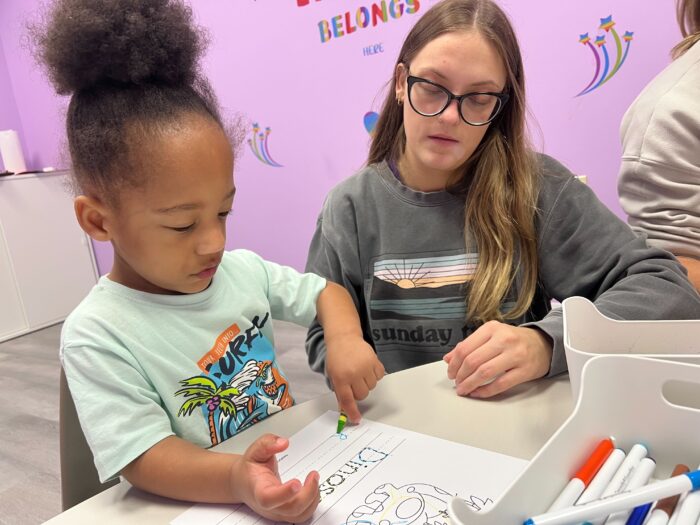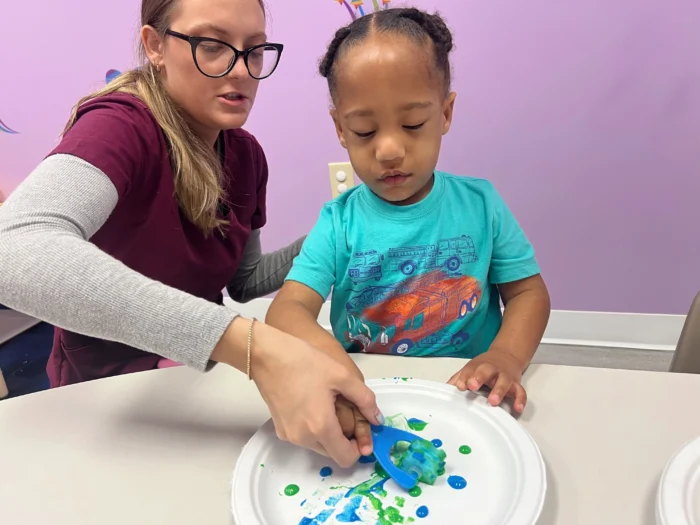
In this article, we’ll walk you through everything you need to know about ABA therapy for your 6-year-old with autism. As a caring and expert team, we understand you’re looking for clear, practical information about treatment options, what to expect, and how this might help your child.
In this blog, we’ll cover the benefits of ABA therapy, explain what the program involves, and highlight common goals. And because we know cost is an important consideration for families, we’ll also address the financial aspects of treatment.
Let’s explore how our team can support your 6-year-old’s journey.
ABA Therapy: Brief Introduction
While there are various treatments available to help children live happy and fulfilling lives with autism, ABA therapy stands out for its extensive research backing and proven results.
At its heart, ABA therapy focuses on understanding how your child learns and interacts with their world, helping them develop all the skills they need to feel comfortable navigating the world around them.
Though this therapy began in the 1960s, it has evolved significantly as our understanding of autism has grown. Modern ABA therapy recognizes that every child with autism is unique, which is why we create highly personalized programs that start with your child’s interests and build from there.
While adults can also benefit from ABA therapy, it’s particularly effective for children. Research has consistently shown that ABA therapy helps children develop crucial social, language, and motor skills while improving their ability to learn and handle daily activities independently.
ABA Therapy at 6 Years Old: Is It Too Late?
While early intervention (before age 3) is often recommended, we understand it isn’t always possible. In the US, the average age of diagnosis is close to 5 years old, even though autism can be reliably diagnosed by age 2. What’s most important to know is that it’s never too late to start supporting your child’s development through ABA therapy.
While traditional intensive therapy involves between 25 and 40 hours of sessions per week, we’ve seen children make significant progress with fewer hours too. At Abacus, we work with you to find the right schedule that fits your child’s needs and your family’s life.
What Does Autism Therapy for a 6-Year-Old Look Like?
We believe there’s no one-size-fits-all approach to autism therapy. Your child’s program will be tailored to their specific needs, goals, and learning style.
After an initial assessment where we get to know your child, therapy sessions can range from 1 to 8 hours daily, depending on individual needs. In our practice, we rarely recommend 8-hour sessions, as we believe in finding a balance that works for both your child and your family.
Locations for the sessions may vary, depending on where your child learns best:
- Center-based ABA therapy
- In-home ABA therapy
- School-based ABA therapy
At Abacus Therapies, we provide individual school-based and in-home therapy across all our locations, with group and center-based ABA therapy coming soon to Charlotte, North Carolina.
The people in charge of leading the sessions and the program are:
- A board-certified behavior analyst (BCBA) who assesses your child and develops their personalized treatment plan.
- A registered behavior technician (RBT) who works directly with your child, implementing the plan and evaluating its appropriateness.
Some of the ABA strategies we most commonly use with 6-year-olds include:
- Pivotal Response Treatment (PRT)
- Discrete Trial Training (DTT)
- Natural Environment Teaching (NET)
- Antecedent-Based Interventions (ABI)
Throughout treatment, your BCBA will regularly check in with you to ensure your child is feeling happy and supported. We encourage parents to observe sessions and participate in training, where you’ll learn strategies that will allow you to guide your child at home. Our therapists also share age-appropriate games and activities you can use outside of sessions.
ABA Goals for a 6-Year-Old
The ultimate goal of ABA therapy is to help your child develop the tools they need for greater independence and connection with their world.
For preschool-age children, we typically focus on four key areas:
Enhancing Communication Skills
We help your child find effective ways to express their emotions and needs, whether through words, sentences, or alternative communication methods. This includes learning to make requests, ask for help, answer questions, and engage in conversations.
Acquiring Social Skills
Building on communication abilities, we support your child in developing social connections. This includes sharing with peers, engaging in parallel play, greeting others, and understanding nonverbal cues like body language and facial expressions.
Developing Daily Routines
We work with your child on practical skills that boost independence, from using utensils at mealtimes to getting dressed and handling personal hygiene like brushing their teeth and toileting.
Improving Motor Skills
Physical development is crucial at this age. A 2020 study showed that ABA therapy was particularly effective in improving gross motor skills in children aged 6-12, helping with everything from basic movements to more complex activities like riding a bike.
Remember, every child develops at their own pace, and that’s exactly as it should be. We carefully monitor how they feel throughout the program to ensure your child is getting the support they need.
The Cost of ABA Therapy for a Six-Year-Old
The cost of ABA therapy varies based on factors including location, setting, and program intensity.
While the investment can feel significant, there are several ways to make it more manageable:
- Many private insurance providers and Medicaid cover ABA therapy
- State-mandated coverage varies (e.g., up to $35,000 annually in Georgia, and $36,000 in Florida)
- Scholarships and grants may be available to help offset costs
Not all policies follow state requirements, so we recommend checking with your insurance administrator for specific details. At Abacus Therapies, we accept various health insurance providers and can help you understand your coverage options.
Final Recommendations
While early intervention is valuable, many families don’t receive an autism diagnosis until their child is 5 or older. What matters most is taking the next step forward, whenever that may be. At Abacus Therapies, we’ve seen countless children thrive in ABA therapy starting at age 6 or older.
We invite you to schedule a free consultation with one of our experienced BCBAs. We’ll help you understand how ABA therapy could benefit your child, develop a personalized treatment plan, and navigate insurance coverage. Our team is here to support your family every step of the way.
FAQ
Is ABA therapy good for autistic children?
Decades of research have shown ABA therapy’s effectiveness in helping children develop crucial life skills. Our approach focuses on your child’s unique needs and interests, helping them connect with their world in meaningful ways.
Is 6 years old too late for ABA therapy?
It’s never too late to start ABA therapy. While some children begin earlier, many start at 6 or older and get all the support they need as they grow. We adjust our approach based on your child’s age and needs.
How do you treat autism in a 6-year-old?
Treatment begins with understanding your child’s unique needs through comprehensive assessment. We then create a personalized improvement plan using evidence-based techniques, carefully tracking their feelings and adjusting strategies as needed.



